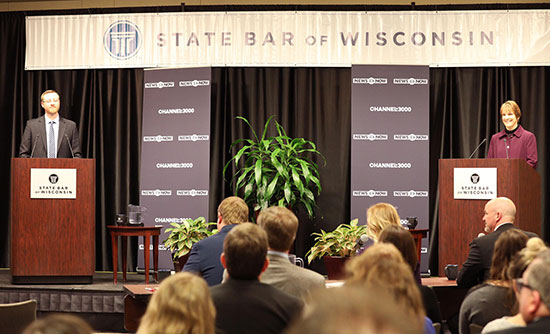
Candidates for the Wisconsin Supreme Court – Brian Hagedorn and Lisa Neubauer – discuss a number of topics in a debate last week at the State Bar Center in Madison.
March 20, 2019 – The race for Wisconsin Supreme Court Justice Shirley Abrahamson’s seat is heating up, as two candidates – Lisa Neubauer and Brian Hagedorn – squared off in a head-to-head debate on judicial philosophy and other topics last week.
Neubauer, chief judge of the Wisconsin Court of Appeals, is facing colleague Hagedorn, also a judge on the Wisconsin Court of Appeals, for the state Supreme Court seat that Abrahamson has held for more than 40 years. Voters will elect one of them on April 2.
The debate, sponsored by the State Bar of Wisconsin, WISC-TV, and WisPolitics, was last Friday night at the State Bar Center. WISC-TV anchor Eric Franke moderated the program, with two political reporters asking the questions. At times a heated exchange, the candidates discussed various issues while giving voters a sense of their judicial identities.
Hagedorn earned a B.A. at Trinity International University and graduated from Northwestern University School of Law in 2006. He clerked for former Wisconsin Supreme Court Justice Michael Gableman, worked in private practice, and held positions as assistant attorney general and chief legal counsel for former Gov. Scott Walker, who appointed him to a vacant seat on the District II Appeals Court in 2015.
Neubauer earned a B.S. from U.W.-Madison and graduated from the University of Chicago Law School in 1987. She clerked for Judge Barbara Crabb of the U.S. District Court for the Western District of Wisconsin and litigated for 18 years at Foley & Lardner (1989 to 2007). In 2007, Gov. Jim Doyle appointed her to the District II Appeals Court. She won election to the seat in 2008, and was re-elected in 2014. In 2015, the Wisconsin Supreme Court appointed Neubauer as chief judge. She was reappointed in 2018.
Judicial Experience
With 11 years of experience on the bench, and thousands of decisions, Neubauer positioned herself as the more experienced candidate, with a solid record of impartiality.
“My record shows that I am tough but fair,” said Neubauer, who lives in Racine. “My record shows that I am fair, impartial, and independent as a judge and that is what this race is all about.”
Neubauer noted that she has the support of more than 342 Wisconsin judges. “They come from red counties and blue counties,” she said.
“They know my record, and they trust that I will be fair, impartial and independent on the Supreme Court if I am honored to be elected by the people of this state.”
Watch the Debate
<iframe src="//www.youtube.com/embed/TZe45Dhr2bY" width="525" height="295" frameborder="0" allowfullscreen></iframe>
Watch the full, one-hour debate between Wisconsin Supreme Court candidates Brian Hagedorn and Lisa Neubauer.
Hagedorn, whose judicial career began in 2015, said he was involved in some of the most significant cases in state history as Gov. Walker’s chief legal counsel and has put his judicial philosophy into practice since Walker appointed him to the bench.
“I've been able to put my judicial philosophy into practice over hundreds and hundreds of cases,” said Hagedorn of Brookfield. "I believe my job as a judge is to say what the law is and not what I think the law should be. My job is to uphold the Constitution as written, which I'm committed to, and also protecting the public.”
JR Ross, an editor at WisPolitics, asked the candidates whether certain state or U.S. Supreme Court justices have influenced their judicial philosophies or their development as judges.
Neubauer did not point to any specific justice, but said the voters should look to the thousands of decisions she has written to determine where she stands on issues that have come before her. She also said the voters should be skeptical about Hagedorn as a “political operative” of Gov. Scott Walker, a phrase to which Hagedorn objected.
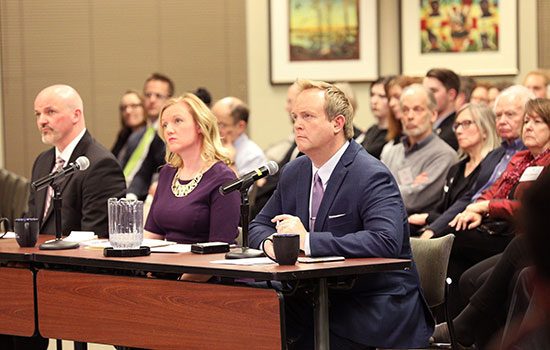
WISC-TV anchor Eric Franke moderated the program, with two political reporters asking the questions – JR Ross, an editor at WisPolitics and WISC-TV Chief Political Reporter Jessica Arp.
“Judge Neubauer said I was a political operative. She obviously doesn't understand what I've done. I was Gov. Walker's chief legal counsel,” Hagedorn said. “I was a lawyer for the office of the governor representing him in a legal capacity. I didn't do politics. I did law, and I did law at a very high level for a long period of time.”
Hagedorn went on to say that he’s an originalist and a textualist. “I look for the original, public meaning of a constitutional text,” he said. “There are a number of judges who have articulated that and lived that out,” said Hagedorn, pointing to U.S. Supreme Court Justices Clarence Thomas, Neil Gorsuch, and the late Antonin Scalia.
Hagedorn said Neubauer upholds Justice Shirley Abrahamson as a model and suggested that Abrahamson has politicized the court, but Neubauer shot back, suggesting Hagedorn’s previous writings highlight where he would stand on key issues.
“I am deeply committed to the proper role of our judiciary as the nonpartisan, third branch that is the people's branch,” said Neubauer, suggesting Hagedorn could not be an impartial judge on important issues, noting his extensive writings in blog posts that make his views known, “not on pretty sunsets, but on key constitutional issues. …”
Political Ties and Roe v. Wade
WISC-TV Chief Political Reporter Jessica Arp noted that judicial races are officially nonpartisan but that each candidate has political ties, Neubauer to Democrats and Hagedorn to Republicans. Arp asked how voters could believe that partisan influences won’t influence their decisions on the court.
Hagedorn said everybody comes to the court with a different view of the world. He reiterated that Judge Neubauer holds Justice Abrahamson up as a model. He said, at the end of the day, the key question comes down to judicial philosophy.
“Nobody has ever criticized me for any case I have written or decided, that I have somehow allowed my politics to influence it … because I never have and I never will. Voters should be concerned about judges who hold up a more political form of judging,” said Hagedorn, suggesting Judge Neubauer would bring her politics to the bench.
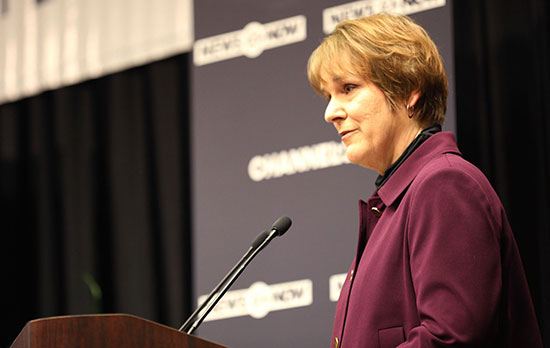
Lisa Neubauer, chief judge of the Wisconsin Court of Appeals.
But Neubauer said it was quite the opposite. ”Our people need to know that when they walk through the courthouse doors, there’s no thumb in the scale, there’s no agenda, there’s no predetermined outcome, it’s not a rigged system, it’s a level playing field. That’s the kind of judge I have been for 11 years. I am deeply committed,” she said.
The candidates also sparred on the issue of money that has crept into the race by outside interest groups. Neubauer said outside money is now coming in from the Koch brothers to help Hagedorn. Hagedorn said Eric Holder’s group is backing Neubauer.
Neubauer reiterated that 345 Wisconsin judges are backing her candidacy, while Hagedorn said Neubauer has been an “active participant” in making this a toxic race by spreading the talking points of liberal interest groups. He said it was “shameful.”
Arp asked whether the candidates believe Roe v. Wade, a landmark 1973 abortion case decided by the U.S. Supreme Court, is settled law and how the candidates view precedent.
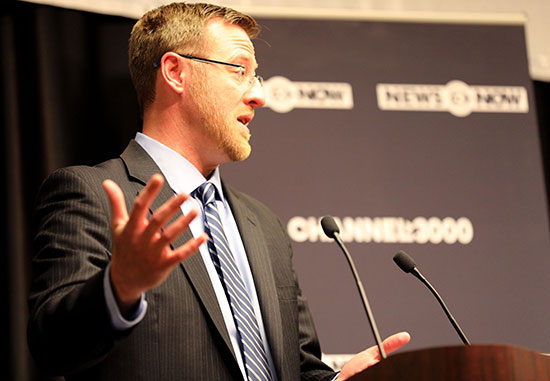
Brian Hagedorn, a judge on the Wisconsin Court of Appeals.
“My approach has always been, with every single case, I have to come to each case with an open mind, no agenda, no ideology,” Neubauer said. “I look at the Constitution, I look at the law, and I do my level best to figure out how it applies to the case before us.”
Neubauer said Roe v. Wade is settled law in the U.S. “That is where we stand,” she said. “In terms of when something is settled law, when it becomes precedential, the issues of stare decisis, those are issue-by-issue, case-by-case,” she said.
“My opponent has expressed significant opinions on the issue of a Roe v. Wade and whether it is settled law, whether it is good law, and again it's not just his writings, it's his actions … at every single phase of his career, including when he put on the robe.”
Hagedorn retorted.
“My job as a judge is to apply all the law that we have. I have always said I will follow a binding precedent from the United States Supreme Court,” he said.
“So, Roe v. Wade and other cases like that, they are binding precedent. It's my obligation to follow them until such time as the United States Supreme Court decides to change something. I've always been faithful to follow the precedent that governs us,” Hagedorn said. “I have never allowed my personal beliefs to impact the cases that I write.”
Recusal and Closed Sessions
JR Ross of WisPolitics asked whether the candidates thought political donations to a judicial campaign should be enough to require recusal on cases later, where a donor is a party. He also asked whether there should be a procedure to allow other judges to force a colleague off a case if a conflict is so severe, it would taint the proceedings.
“It is clear, I think, in some situations, when a substantial donation has been given, judges ought to step off those cases if that case is pending before you,” Hagedorn said.
“We saw that in the Caperton case, and certainly if there was a substantial donation while a case was pending before me, I would recuse.”
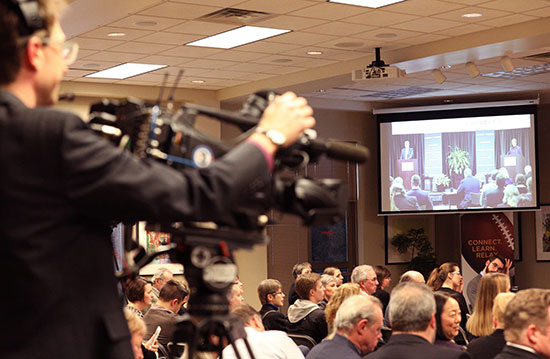
Attendees listen to the candidates debate judicial philosophy and other topics.
Neubauer noted the Supreme Court adopted the current recusal rule that says judges can make their own call on recusal. A number of retired judges submitted a petition to address that as a problem. But the state Supreme Court did not hold a hearing on it.
“To me, that is shameful, it is anti-democratic, it is a disregard for the public and the public's confidence in our court system,” Neubauer said. “We have to have our people know that our courts are there for them and not the millions of dollars that has been spent over the last decade on our Supreme Court races.”
Arp asked about the state Supreme Court’s decision to hold administrative conferences on petitions and other rulemaking functions in closed-door sessions. She asked the candidates whether those conferences should be open to the public again.
“This is a question, again, about how do we ensure that our people have confidence in our court, and I am all in favor of transparency,” Neubauer said.
“We need to have those conferences be open so that people can see the decisions our court makes about such things as the recusal rule that we just talked about.”
Hagedorn said open sessions were unique to Wisconsin, but he would be willing to reconsider the rule.
“As far as I understand, the rule that was in place in Wisconsin was the only place in the country where they actually had a rule like that and that no other places in the country have actually followed suit,” Hagedorn said. “I'm open to hearing good ideas on that.”
“The goal is to build confidence in the court, that we are transparent, that we build confidence that we are a place that's collegial and respectful.
“Unfortunately a lot of those open hearings became places that didn't build confidence in the court where there was a lot of infighting, which is a problem in and of itself.”
Right to Bear Arms
Arp asked whether the candidates agreed with the majority or the minority in 5-4 decision of the U.S. Supreme Court, District of Columbia v. Heller, 554 U.S. 570 (2008), holding the right to bear arms applies to individuals, not just militias or military members.
 Joe Forward, Saint Louis Univ. School of Law 2010, is a legal writer for the State Bar of Wisconsin, Madison. He can be reached by email or by phone at (608) 250-6161.
Joe Forward, Saint Louis Univ. School of Law 2010, is a legal writer for the State Bar of Wisconsin, Madison. He can be reached by email or by phone at (608) 250-6161.
Neubauer said the judicial ethics rules preclude her from answering questions on the merits of issues that could come before the court, and declined to answer directly.
“Why do we have that rule? We have that rule because our people need to have confidence that there's no prejudging when they walk into that courtroom, that every single case the judge is going to or the justice is going to have an open mind to look at each and every individual case with the facts and the law, and that's what I've done for 11 years,” Neubauer said.
Hagedorn suggested Neubauer was dodging the question, because the judicial code restricts what judges can say in some instances, but it “certainly does not prevent us from commenting on every sort of question that comes; that's just not true.”
The majority in the Heller decision, he said, “was based upon the original public meaning of the Constitution, looking at what those words say.
“So, the best thing I can say right now is that [the majority] used the right approach,” Hagedorn said. “It wasn't about, ‘do we think that gun laws are good or bad, do we think that we need to enforce some and not others.’ That’s not the job of judges.”
